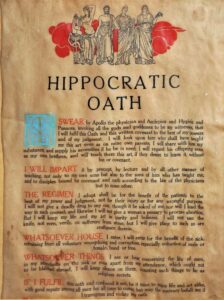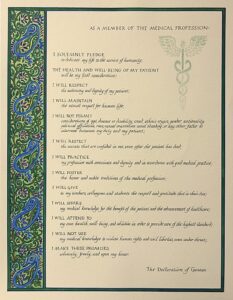This article is a continuation from an initial commentary piece. Incase you missed the first part; you can read the article here.
MYTH 7: Doctors are not allowed or supposed to fall ill or call in sick. Doctors should not rest or take a leave. Doctors should not sleep (on or off duty) and should always be at patient’s beck and call.
FACT: Doctors are humans. And like every other human being, doctors are as well prone to every humanly thing possible. These include feeling fatigue, falling ill, been overwhelmed or overly stretched thin by situation and circumstances of life or even the work environment they find themselves in. Which can go on to not only harm the doctor’s health but also the wellbeing of those receiving care from them.
For emphasis, long gone are the days “Doctors” were looked up onto as “Gods”, now – they are mere mortals also trying to survive the rigours and travails of the world. Therefore, just like every worker worthy of his day(s) of rest; doctors and medics are deserving of sleep, rest and some time off saving the world – to save themselves.
Remember, an overworked or stressed doctor can easily become a dangerous doctor, and the best way to avoid this is by taking adequate rest for the body, soul and spirit.
MYTH 8: The “Hippocratic oath” is legally-binding on doctors to answer to everyone or anyone at every place or anytime.
FACT: On this issue of doctors always been held up to the Hippocratic oath they swore at their induction ceremony into the medical and dental profession; personally, I am of the opinion that a full understanding of what the oath is, how it came to be and what it actually means is very pertinent to this demystification.
First, what is the Hippocratic oath?
The Hippocratic oath, usually attributed to Hippocrates (the Traditional Father of Medicine), was written as far back as the fifth centuries Before Christ (BC). Its first sample was written in Greek, as it pertained to medical practice and the physicians’ obligations in that era. After which, it has since been revised severally to suit the modern-day practice of medicine, as it evolved.
Second, what does it contain?
When non-medics speak about the Hippocratic oath, most of them don’t know or understand the content of the document. With a false sense of assumption that the oath morbidly ties the entirety and existence of a doctor to their professional obligations. This makes a lot more people turn blind eyes to the new revisions that have now placed emphases on the physician’s wellbeing as well.
Here are two copies of an older and newer versions of the oath for our careful perusal.


In summary, the Hippocratic oath was created by (the) physician(s) for (the) physician(s), as a code of medical ethics and constant reminder for doctors – when overwhelmed by the workload or eventuality of practicing medicine in our various environments. The oath was never written to “enslave” or “guilt trip” the doctors, neither was it written for the general public – to use it against the physician. Rather, it was written as a “code of conduct and honour” strictly to be upheld by doctors, for doctors, and nothing extra. It is also worthy of note that other medical professionals also have their different adapted oaths, e.g. The Nightingale Pledge for Nurses (Nurses Oath), The Oath of a Pharmacist, the Hippocratic Oath for Scientists and so on.
In view of this, members of the general public must always resist the urge of using the Hippocratic oath to blackmail, gaslight, exploit or threaten the physician or any other healthcare professional. This act is highly unhealthy, uncalled for and counterproductive.
MYTH 9: Doctors do not or should not have a social life. Doctors should always have stereotypical appearance. Doctors are not allowed to explore or have on certain looks or styles.
FACT: Having a social life or peculiar style is a personal trait. And as much as sociodemographic factors like societal class, family upbringing, religion, profession and others weigh heavily on this, they are not an absolute determinant. This means, there is no absolute contraindication that says been a doctor makes a person anti-social or not have a social life. However, due to the highly demanding and rigorous training of the medical training and profession, these might further reduce the chances of doctors indulging in regular social activities. Albeit – against all odds – doctors have still been known to be able to manage their time and resources towards achieving their social gratification. Hence, their “unusual” participation and diversification into various recreational activities and hobbies, which they thrive in efficiently.
Likewise, as regards dressing or appearance: as much as the general professional outlook demands and is rooted in some utmost level of decorum and decency; professionals should not be stereotyped. Because, the liberal expression of an individual’s style helps their personality and functionality, which are highly needed to make a wholesome doctor. This is why, in some westernized communities where they attach no sentimental values to how people dress or appear, doctors are allowed to look however they deem fit. So far it doesn’t affect their duties to the patients, fellow colleagues, the patients’ outcomes and others around them.
Therefore, questions that should always be asked when this issue of style or appearance comes up are: Is this doctor’s style or outlook objectively suitable for occasion – like in the case of any other person? Does this dressing or appearance affect the doctor’s knowledge, skill or optimal delivery of services? Does this style or dressing affect the doctor’s duties to patients, their health outcomes or others around them? If the responses to these are not on the negative side, then I believe the style or appearance of doctors should not be a cause of dispute and (they) be allowed to decide their personal styles as they consider appropriate.
MYTH 10: Doctors do not make good partners or never have time for their spouse and family… Doctors are promiscuous fellow.
FACT: Every professional or career-oriented person actively involved in a family all make sacrifices to attain a good work-family-life balance… and this is not only distinctive to the medical profession. However, due to the ingrained commitment and huge amount of time invested in and consumed by the practice of the medical profession, what is for a fact known is that; the sacrifices to attain that balance of creating enough time for spouses or family by medical doctors might be harder. But this is not impossible and eventually, it boils down to personal choices and priorities. For instance, female doctors have been seen to still function actively as mothers and wives, while fully practicing medicine. Furthermore, beyond the profession, making a good partner is highly dependent on personal traits, convictions and upbringing. This also applies to the issue of promiscuity among doctors.
MYTH 11: Young doctors are baby doctors or NYSC doctors are student doctors.
FACT: Young doctors – either undergoing internship or National Youth Service Corps (NYSC) – should not be referred to as baby doctors. This is because, they are medical or dental doctors (not “baby” doctors) who have spent nothing less than 6 years in medical school (some up to 10 years or more) to complete their medical or dental degree and have been issued a provisional or full licence to practice accordingly.
No doctor (with a medical or dental degree) is a baby doctor and referring to them as such, is highly unprofessional. Also, only students still in medical school, may be referred to as student doctors, not one with a medical degree and a practicing licence.
MYTH 12: Every female in the hospital is a nurse and every male is a doctor.
FACT: Although most nurses are female, but not all females in the hospital are nurse. Likewise, there might be a higher proportion of male doctors (especially in some specialities), but not all males in the hospital are doctors. This is because, anyone – both women and men – can be anything they want to be, and there is a wide range of healthcare roles in the hospital they can belong to. These include being doctors, nurses, pharmacists, lab. scientists, community health officers, community health extension workers, healthcare assistant, nursing assistant and so on.
Furthermore, in our today’s world of diverse possibilities and equal gender opportunities, women are consistently pushing boundaries and breaking the breaking the glass ceilings. Hence, there is no role strictly reserved for just a particular gender in the healthcare profession. However, there might be a higher prevalence or dominance of a particular gender across different cadres of healthcare professionals.
It is also worthy of note that some parastatals (e.g., the military) and subspecialities (e.g., in surgery and theatre nursing) – against the typical norm – have more male nurses than female nurses. And as well, some subspecialities in Medicine and Dentistry, have more female doctors than male doctors.
MYTH 13: Doctors are unnecessarily proud.
FACT: Being perceived as “proud” is subjective. Highly subjective because it’s dependent on a lot of undertones from the person perceiving someone else as proud and the person being perceived as proud. This simply put, means different actions and reactions from both parties contribute to the conclusion that “someone is proud”. However, it is not uncommon that a great dose of self-confidence, high self-esteem and a high sense of professionalism are all easily misinterpreted as being proud. Also, it is not wrong for people who have worked hard for their professional achievements to take pride in their profession. This does not make them proud; it only makes them human and the professionals they actually are.
MYTH 14: Doctors are enemies of pastors or spiritualists… Doctors are against divine healing and miracles…
FACT: Doctors are men (and women) of science who believe and practice evidence-based medicine i.e., their processes and outcomes are explainable by science and normal human reasoning or logic. While Pastors or Spiritualists are men (and women) of religion and God, who believe in faith and the supernatural i.e., their processes and outcomes are unexplainable by science, normal human reasoning or logic.
Divine healing and miracles are elements of the supernatural, faith and religion. Hence, the visible contradiction of both groups being on the same side. However, Doctors are not enemies of religious leaders or spiritualists, neither are they against divine healing and miracles, as some of them are strong believers, spiritualists and religious leaders as well. Instead, as trained professionals in the medical sciences, they (will) openly and strongly comply with science that can be explained, as opposed to going by a miracle that cannot be scientifically explained, backed or documented.
Medicine and Miracles are not mutually exclusive. If you think about it, the art of healing (which is Medicine) is in itself a “Miracle” to human existence, and the profession of medicine is grounded in the history of most religious beliefs.
MYTH 15: Medical professionals who specialise in nonclinical pathways are not as smart as those in the clinical field.
FACT: This thought, or statement is completely untrue. Some people even go ahead to say, that those who go into public health or other nonclinical careers after medical school are probably those who cannot stand the heat or handle the task of clinical practice. Albeit, what is true is that any average medical student who completed and graduated from medical school is smart enough and has the capability to specialise into any field of medicine. This is one of the many reasons why the medical degree is not classified using the undergraduate degree classification system of first, second or third classes. Also, personal interest, enthusiasm, exposure and long-term goals contribute hugely to this choice.
Consistently, we have had instances where distinction and best graduating students specialise in non-clinical practices. Also, cases where some who veered into the clinical practice of medicine found themselves back on the non-clinical pathways. This doesn’t make any less of a doctor – infact, it makes them more of an amazing physician with remarkable versatility. It just shows the individuality amongst people, different choices people make, or career paths people find themselves on.
Allow people be and excel in whatever specialty they decide to go into.
Editor’s note:
This article was compiled and written by Mary O. Agoyi. Other contributors are Kunmi Ogunyemi, Sharon Chinwuba, Oshati Oyindamola, Joshua Olajugba, Nonso Ikechukwu, Olamide Sowole, Ayinde Tegzi and other members of the 2017 medical and dental class of College of Medicine, University of Lagos (CMUL).



